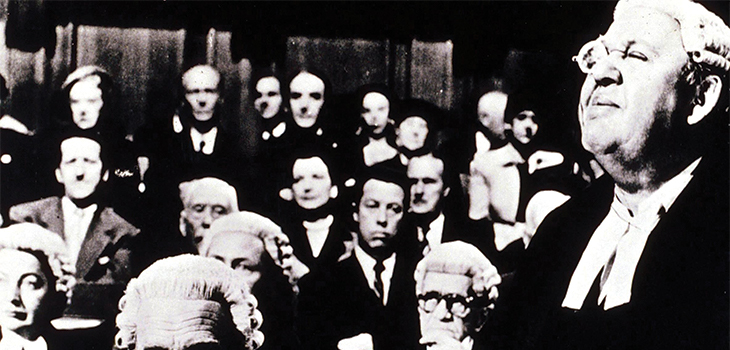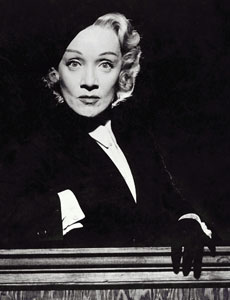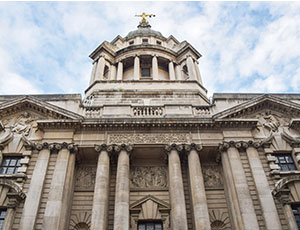*/

The Rumpole books are emblematic of a certain type of criminal barrister but, in this writer’s view, the greatest ever portrayal of a mock-heroic portly QC is not Leo McKern as Horace Rumpole but Charles Laughton as Sir Wilfrid Robarts (pictured above) in Witness for The Prosecution.
Set in the Old Bailey, Witness for The Prosecution (1957) is a dramatization of the Agatha Christie play (1953) by one of the greatest of all directors, Billy Wilder. Leonard Vole (Tyrone Power) is accused of murdering Emily French, a wealthy widow. Vole’s German wife Christine (Marlene Dietrich in one of her best performances) purportedly is going to act as an alibi for him at the trial. Much of the film concerns the courtroom drama. There are plenty of advocacy surprises, twists and turns, startling questions and, indeed, endings.
The legendary silk, Laughton’s Sir Wilfrid, agrees to represent Vole. His is the classic portrayal of the stout champion senior counsel, much like the Irish Bar giant Patrick McEntee SC, whose flamboyant manner and private persona belies the fact that most of his success is due to meticulous preparation and an impressive command of case law and especially the rules of evidence. The profession of the Bar is presented as a noble one; Wilder was so captivated by Laughton in this role that he was fully framed in all his shots. In later years, he enthused about the actor’s perfectionism: ‘When we had a big scene coming up the next day, Laughton would come to my room, and he would do that big scene, and know every word... Then he would do it another way, twenty times. And he was better and better and better.’
The film is also an especially useful illustration of aspects of the barrister’s craft. The importance of the cab rank rule is present when Sir Wilfrid, who has just recovered from a major illness, steps into the breach once more in a capital case as part of his sense of professional obligation – and, it must be said, for the sheer thrill of it. The ability not to refuse a client when you have the time to do it and above all not to be picky about who you represent is a critical part of the barrister’s practice and often misunderstood (and lawyers unfairly demonised for those they represent). One of the great qualities of the 20th century lawyer Clarence Darrow (whom I have hitherto written about for Counsel and other vectors), which earned him the soubriquet Attorney for The Damned, was that he would represent anybody; no matter how much condemned in the court of public opinion.
Yet the man Sir Wifrid got acquitted was guilty. It is an old lawyer joke (and occupational hazard particularly for defence lawyers) that clients can manipulate lawyers (Rumpole was, after all, manipulated by the Timpsons). Leonard Vole: ‘But this is England, where I thought you never arrest, let alone convict, people for crimes they have not committed.’ Sir Wilfrid: ‘We try not to make a habit of it.’

Agatha Christie was fascinated by the criminal justice system and although set in post-war times, the depiction of the law as an old boys’ club, with some participants blinded by prejudice, class and their attitudes to women, is still eerily resonant today. The film also illustrates the rule of double jeopardy, though the admission of fresh evidence (permissible since 2003) may have changed the denouement.
The real stories heard in the Old Bailey, with its imposing gothic horror architecture, are often grim and unpleasant. The Krays were tried here, and this fatalistic court witnessed the farce and miscarriage of justice endured by Edith Thompson (well depicted in a book by Rene Weiss, Criminal Justice (1990)).
Many of us, on entering and leaving the building, gaze upwards to see the famous balancing scales of justice. A few years ago, on securing an acquittal, I was struck by the much less imposing, though equally important, words inscribed over the door in 1912 as the motto of that court: ‘Protect the Children of the Poor and Punish the Wrongdoer.’ Now this seemed to be deeply strange and in a Joycean sense an epiphany. Protect the children of the poor? Should it not be protecting poor and innocent children and adults and punish the wrongdoer? Well, not always is the wrongdoer punished and the innocent are convicted, as I know too well.

As a codicil, this leads me on to Laughton’s one foray, in an illustrious career, into film directing. Though he thought it a complete failure at the time it was, in my view, his greatest achievement and one of the greatest films ever made about children. Night of The Hunter (1955) is deeply disturbing in its focus on a mentally deranged, sociopathic killing machine and religious maniac (played impeccably by Robert Mitcham). The face of the great silent movie actress Lillian Gish, unretired for this film, ends the movie with bright stars and children’s faces floating and twinkling all around her, as she issues a stern biblical warning about the good and evil of the world: ‘Beware of false prophets.’ A warning for present times too, against those who perpetuate increasing forms of extremism, and the abuse it fosters.
Today, we would do well in the light of Laughton’s two contributions to remember that motto in the Old Bailey and protect the children of the poor and punish the wrongdoer. But with ever widening inequality (remote hearings creating, despite the best efforts of the Bar and for prudential reasons, remote justice) and ever more punitive and draconian laws mixing civil and criminal processes, or now in the protest context guilt by potential subjective assert, can we do so effectively?
Those who pass the draconian legislation for whatever pretextual reason in a world of (perhaps overstated) crisis may do well to heed the words of Sir Wilfrid: ‘Kings, prime ministers, archbishops, even barristers have stood in the dock.’

The Rumpole books are emblematic of a certain type of criminal barrister but, in this writer’s view, the greatest ever portrayal of a mock-heroic portly QC is not Leo McKern as Horace Rumpole but Charles Laughton as Sir Wilfrid Robarts (pictured above) in Witness for The Prosecution.
Set in the Old Bailey, Witness for The Prosecution (1957) is a dramatization of the Agatha Christie play (1953) by one of the greatest of all directors, Billy Wilder. Leonard Vole (Tyrone Power) is accused of murdering Emily French, a wealthy widow. Vole’s German wife Christine (Marlene Dietrich in one of her best performances) purportedly is going to act as an alibi for him at the trial. Much of the film concerns the courtroom drama. There are plenty of advocacy surprises, twists and turns, startling questions and, indeed, endings.
The legendary silk, Laughton’s Sir Wilfrid, agrees to represent Vole. His is the classic portrayal of the stout champion senior counsel, much like the Irish Bar giant Patrick McEntee SC, whose flamboyant manner and private persona belies the fact that most of his success is due to meticulous preparation and an impressive command of case law and especially the rules of evidence. The profession of the Bar is presented as a noble one; Wilder was so captivated by Laughton in this role that he was fully framed in all his shots. In later years, he enthused about the actor’s perfectionism: ‘When we had a big scene coming up the next day, Laughton would come to my room, and he would do that big scene, and know every word... Then he would do it another way, twenty times. And he was better and better and better.’
The film is also an especially useful illustration of aspects of the barrister’s craft. The importance of the cab rank rule is present when Sir Wilfrid, who has just recovered from a major illness, steps into the breach once more in a capital case as part of his sense of professional obligation – and, it must be said, for the sheer thrill of it. The ability not to refuse a client when you have the time to do it and above all not to be picky about who you represent is a critical part of the barrister’s practice and often misunderstood (and lawyers unfairly demonised for those they represent). One of the great qualities of the 20th century lawyer Clarence Darrow (whom I have hitherto written about for Counsel and other vectors), which earned him the soubriquet Attorney for The Damned, was that he would represent anybody; no matter how much condemned in the court of public opinion.
Yet the man Sir Wifrid got acquitted was guilty. It is an old lawyer joke (and occupational hazard particularly for defence lawyers) that clients can manipulate lawyers (Rumpole was, after all, manipulated by the Timpsons). Leonard Vole: ‘But this is England, where I thought you never arrest, let alone convict, people for crimes they have not committed.’ Sir Wilfrid: ‘We try not to make a habit of it.’

Agatha Christie was fascinated by the criminal justice system and although set in post-war times, the depiction of the law as an old boys’ club, with some participants blinded by prejudice, class and their attitudes to women, is still eerily resonant today. The film also illustrates the rule of double jeopardy, though the admission of fresh evidence (permissible since 2003) may have changed the denouement.
The real stories heard in the Old Bailey, with its imposing gothic horror architecture, are often grim and unpleasant. The Krays were tried here, and this fatalistic court witnessed the farce and miscarriage of justice endured by Edith Thompson (well depicted in a book by Rene Weiss, Criminal Justice (1990)).
Many of us, on entering and leaving the building, gaze upwards to see the famous balancing scales of justice. A few years ago, on securing an acquittal, I was struck by the much less imposing, though equally important, words inscribed over the door in 1912 as the motto of that court: ‘Protect the Children of the Poor and Punish the Wrongdoer.’ Now this seemed to be deeply strange and in a Joycean sense an epiphany. Protect the children of the poor? Should it not be protecting poor and innocent children and adults and punish the wrongdoer? Well, not always is the wrongdoer punished and the innocent are convicted, as I know too well.

As a codicil, this leads me on to Laughton’s one foray, in an illustrious career, into film directing. Though he thought it a complete failure at the time it was, in my view, his greatest achievement and one of the greatest films ever made about children. Night of The Hunter (1955) is deeply disturbing in its focus on a mentally deranged, sociopathic killing machine and religious maniac (played impeccably by Robert Mitcham). The face of the great silent movie actress Lillian Gish, unretired for this film, ends the movie with bright stars and children’s faces floating and twinkling all around her, as she issues a stern biblical warning about the good and evil of the world: ‘Beware of false prophets.’ A warning for present times too, against those who perpetuate increasing forms of extremism, and the abuse it fosters.
Today, we would do well in the light of Laughton’s two contributions to remember that motto in the Old Bailey and protect the children of the poor and punish the wrongdoer. But with ever widening inequality (remote hearings creating, despite the best efforts of the Bar and for prudential reasons, remote justice) and ever more punitive and draconian laws mixing civil and criminal processes, or now in the protest context guilt by potential subjective assert, can we do so effectively?
Those who pass the draconian legislation for whatever pretextual reason in a world of (perhaps overstated) crisis may do well to heed the words of Sir Wilfrid: ‘Kings, prime ministers, archbishops, even barristers have stood in the dock.’


Kirsty Brimelow KC, Chair of the Bar, sets our course for 2026
What meaningful steps can you take in 2026 to advance your legal career? asks Thomas Cowan of St Pauls Chambers
Marie Law, Director of Toxicology at AlphaBiolabs, explains why drugs may appear in test results, despite the donor denying use of them
Asks Louise Crush of Westgate Wealth Management
AlphaBiolabs has donated £500 to The Christie Charity through its Giving Back initiative, helping to support cancer care, treatment and research across Greater Manchester, Cheshire and further afield
Q and A with criminal barrister Nick Murphy, who moved to New Park Court Chambers on the North Eastern Circuit in search of a better work-life balance
The appointments of 96 new King’s Counsel (also known as silk) are announced today
Ready for the new way to do tax returns? David Southern KC continues his series explaining the impact on barristers. In part 2, a worked example shows the specific practicalities of adapting to the new system
Resolution of the criminal justice crisis does not lie in reheating old ideas that have been roundly rejected before, say Ed Vickers KC, Faras Baloch and Katie Bacon
With pupillage application season under way, Laura Wright reflects on her route to ‘tech barrister’ and offers advice for those aiming at a career at the Bar
Jury-less trial proposals threaten fairness, legitimacy and democracy without ending the backlog, writes Professor Cheryl Thomas KC (Hon), the UK’s leading expert on juries, judges and courts